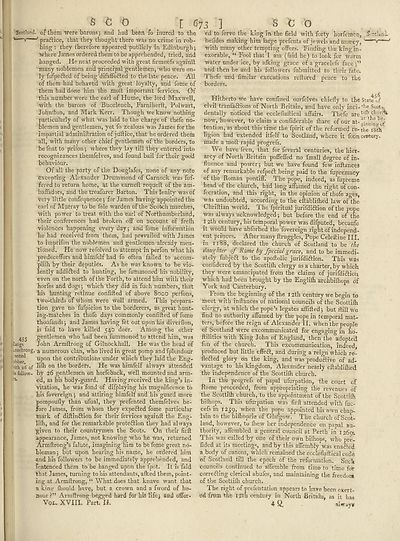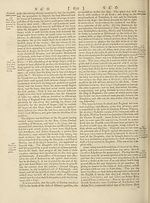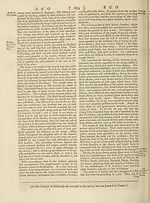Encyclopaedia Britannica, or, a Dictionary of arts, sciences, and miscellaneous literature : enlarged and improved. Illustrated with nearly six hundred engravings > Volume 18, RHI-SCR
(711) Page 673
Download files
Complete book:
Individual page:
Thumbnail gallery: Grid view | List view

SCO
Scotland
f 455
| langs
i Lrmftrong,
| noted
! ibber,
I 'ith of
| is follow-
rs.
of them "Were barons; and had been fo inured to the
* praftice, that they thought there was no crime in rob¬
bing : they therefore appeared publicly in Edinburgh;
where James ordered them to be apprehended, tried, arid
hanged. He next proceeded with great firmnefs again!!
many noblemen and principal gentlemen, who were on¬
ly fufpefted of being difaffefted to the late peace. All
of them had behaved with great loyalty, and fome of
them had done him the moft important fervices. Of
this number were the earl of Hume, the lord Maxwell,
with the barons of Buccleuch, Farniherft, Polwart,
Johntlon, and Mark Kerr, Though we know nothing
particularly of what was laid to the charge of thefe no¬
blemen and gentlemen, yet fo zealous was James for the
impartial adminiftration of juftice, that he ordered them
all, with many other chief gentlemen of the borders, to
be fent to prifon; where they lay till they entered into
recognizances themfelves, and found bail for their good
behaviriur.
Of all the party of the Douglafes, none of any note
excepting Alexander Drummond of Carnock was fuf-
fered to return home, at the earneft reqUeft of the am-
bafl'adors, and the treafurer Barton. This lenity was of
very little confequence; for James having appointed the
earl of Murray to be foie warden of the Scotch marches,
with power to treat with the earl of Northumberlarid,
their conferences had broken off on account of freflr
violences happening every day; and fome information
he had received from them, had prevailed with James
to imprifon the noblemen and gentlemen already men¬
tioned. He now refolved to attempt in perfon what his
predeceffors and himfelf had fo often failed to accom-
plifh by their deputies. As he was known to be vio¬
lently addi&ed to hunting, he fummOried his nobility,
even on the north of the Forth, to attend him with their
horfes and dogs; which they did in fuch numbers, that
his hunting retinue confided of above 8000 perfons,
two-thirds of whom Were well armed. This prepara¬
tion gave no fufpicion to the borderers, as great hunt¬
ing-matches in thofe days commonly confifted of fome
thorifands; and James having fet out upon his diverfion,
is faid to have killed 540 deer. Among the other
gentlemen who had been fummoned to attend him, was
John Armftrong of Gilnockhall. He was the head of
a numerous clan, who lived in great pomp and fplendour
upon the contributions under which they laid the Eng-
lifli on the borders. He was himfelf always attended
by 26 gentlemen on horfeback, well mounted and arm¬
ed, as his body-guard. Having received the king’s in¬
vitation, he was fond of difplaying his magnificence to
his fovereign ; and attiring himfelf and his guard more
pompoufly than ufual, they prefented themfelves be¬
fore James, from whom they expected fome particular
mark of diftinftion for their fervices again!! the Eng-
lifh, and for the remarkable prote£!ion they had always
given to their countrymen the Scots. On their fir!!
appearance, James, not knowing who he was, returned
Armftrong’s falute, imagining him to be fome great no¬
bleman; but upon hearing his name, he ordered him
and his followers to be immediately apprehended, and
fentenced them to be hanged upon the fpot. It is faid
that James, turning to his attendants, afked them, point¬
ing at Armftrong, “ What does that knave avant that
a kine ftiould have, but a crown and a fword of ho¬
nour ?” Armftrong begged hard for his life$ and offer-
Vol. XVIIL Fart. Ih
C 673 1
SCO
3
ed to ferve the king in the field with forty horfemcn, Scbtlanc
befides making him large prefents of jewels and money, '““"Y"""
Avith many other tempting offers. Finding the king in¬
exorable, “ Fool that I am (faid he) to look for Avarm
"Water under ice, by alking grace of a gracelefs face
and then he and his followers fubmitted to their fate.
Thefe and fitnilar executions retlored peace to the
borders.
Hitherto We have confined ourfelvOs chiefly to the Stated
civil tranfa&ions of North Britain, and have only inci-d-.e Scot-.,
dentally noticed the ecclefiaftical affairs. Thefe are ci’ur0^
at the ber
noAv, hoAvever, to claim a confiderable ihare of our at-0;nnjn 0f
tention, as about this time the fpirit of the reformed re-the isfh
ligion had extended itfelf to Scotland, Avhere it foon century,
made a moft rapid progrefs.
We have feen, that for feveral centuries, the hier-
arcy of North Britain poffeffed no fmall degree of in¬
fluence and poAvCr; but we have found few inftanceS
of any remarkable refpeft being paid to the fupremacy
of the Roman pontiff. 1 he pope, indeed, as fupreme
head of the church, had long affumed the right of con-
fecration, and this right, in the opinion of thofe ages,
avas undoubted, according to the eftablifhed law of the
Chriftian Avorld. The fpiritual jurifdi&ion of the pope
AVas always acknoAvledged; but before the end of the
1 2th century, his temporal poAver Avas difputed, becaufe
it would have abforbed the fovereign right of independ¬
ent princes. After many ftruggles. Pope Celeftine III.
in 1188, declared the church of Scotland to be the
daughter of Rome by fpecialgrace, and to be immedi¬
ately fubjeft to the apoftolic jurifdidlion. This was
confidered by the Scottifti clergy as a charter, by which
they Avere emancipated from the claims of jurifdiftiori
which had been brought by the Englifh archbilhops of
York and Canterbury.
From the beginning of the 12th century avc begin to
meet with inftances of national councils of the Scottilh
clergy, at which the pope’s legates aflifted; but ftill avc
find no authority affumed by the pope in temporal mat¬
ters, before the reign of Alexander II. when the people
of Scotland Avere excommunicated for engaging in ho-
ftilities Avith King John of England, then the adopted
fun of the church. This excommunication, indeed,
produced but little effedl, and during a reign which re-
flefted glory on the king, and Avas produdlive of ad¬
vantage to his kingdom, Alexander nearly eftabliflied
the independence of the Scottifh church.
In the progrefs of papal ufurpation, the court of
Rome proceeded, from appropriating the revenues of
the Scottilh church, to the appointment of the Scottifti
biftiops. This ufurpation Avas fir!! attended with fuc-
cefs in 1259, Avhen the pope appointed his oAvn chap¬
lain to the bifhopric of GlafgoAV. The church of Scot¬
land, however, to IheAV her independence on papal au¬
thority, affembled a general council at Perth in 1269'.
This was called by one of their own biihops, Avho pre-
fided at its meetings and by this affembly was enadled
a body of canons, Avhieh remained the ecclefiaftical code
of Scotland till the epoch of the reformation. Suck
councils- continued to affemble from time to time ftri*
corredling clerical abufes, and maintaining the freedom
of the Scottifti church.
The right of prefentation appears to hare been exert¬
ed from the 12th century in North Britain, as it has
4 Q, always
Scotland
f 455
| langs
i Lrmftrong,
| noted
! ibber,
I 'ith of
| is follow-
rs.
of them "Were barons; and had been fo inured to the
* praftice, that they thought there was no crime in rob¬
bing : they therefore appeared publicly in Edinburgh;
where James ordered them to be apprehended, tried, arid
hanged. He next proceeded with great firmnefs again!!
many noblemen and principal gentlemen, who were on¬
ly fufpefted of being difaffefted to the late peace. All
of them had behaved with great loyalty, and fome of
them had done him the moft important fervices. Of
this number were the earl of Hume, the lord Maxwell,
with the barons of Buccleuch, Farniherft, Polwart,
Johntlon, and Mark Kerr, Though we know nothing
particularly of what was laid to the charge of thefe no¬
blemen and gentlemen, yet fo zealous was James for the
impartial adminiftration of juftice, that he ordered them
all, with many other chief gentlemen of the borders, to
be fent to prifon; where they lay till they entered into
recognizances themfelves, and found bail for their good
behaviriur.
Of all the party of the Douglafes, none of any note
excepting Alexander Drummond of Carnock was fuf-
fered to return home, at the earneft reqUeft of the am-
bafl'adors, and the treafurer Barton. This lenity was of
very little confequence; for James having appointed the
earl of Murray to be foie warden of the Scotch marches,
with power to treat with the earl of Northumberlarid,
their conferences had broken off on account of freflr
violences happening every day; and fome information
he had received from them, had prevailed with James
to imprifon the noblemen and gentlemen already men¬
tioned. He now refolved to attempt in perfon what his
predeceffors and himfelf had fo often failed to accom-
plifh by their deputies. As he was known to be vio¬
lently addi&ed to hunting, he fummOried his nobility,
even on the north of the Forth, to attend him with their
horfes and dogs; which they did in fuch numbers, that
his hunting retinue confided of above 8000 perfons,
two-thirds of whom Were well armed. This prepara¬
tion gave no fufpicion to the borderers, as great hunt¬
ing-matches in thofe days commonly confifted of fome
thorifands; and James having fet out upon his diverfion,
is faid to have killed 540 deer. Among the other
gentlemen who had been fummoned to attend him, was
John Armftrong of Gilnockhall. He was the head of
a numerous clan, who lived in great pomp and fplendour
upon the contributions under which they laid the Eng-
lifli on the borders. He was himfelf always attended
by 26 gentlemen on horfeback, well mounted and arm¬
ed, as his body-guard. Having received the king’s in¬
vitation, he was fond of difplaying his magnificence to
his fovereign ; and attiring himfelf and his guard more
pompoufly than ufual, they prefented themfelves be¬
fore James, from whom they expected fome particular
mark of diftinftion for their fervices again!! the Eng-
lifh, and for the remarkable prote£!ion they had always
given to their countrymen the Scots. On their fir!!
appearance, James, not knowing who he was, returned
Armftrong’s falute, imagining him to be fome great no¬
bleman; but upon hearing his name, he ordered him
and his followers to be immediately apprehended, and
fentenced them to be hanged upon the fpot. It is faid
that James, turning to his attendants, afked them, point¬
ing at Armftrong, “ What does that knave avant that
a kine ftiould have, but a crown and a fword of ho¬
nour ?” Armftrong begged hard for his life$ and offer-
Vol. XVIIL Fart. Ih
C 673 1
SCO
3
ed to ferve the king in the field with forty horfemcn, Scbtlanc
befides making him large prefents of jewels and money, '““"Y"""
Avith many other tempting offers. Finding the king in¬
exorable, “ Fool that I am (faid he) to look for Avarm
"Water under ice, by alking grace of a gracelefs face
and then he and his followers fubmitted to their fate.
Thefe and fitnilar executions retlored peace to the
borders.
Hitherto We have confined ourfelvOs chiefly to the Stated
civil tranfa&ions of North Britain, and have only inci-d-.e Scot-.,
dentally noticed the ecclefiaftical affairs. Thefe are ci’ur0^
at the ber
noAv, hoAvever, to claim a confiderable ihare of our at-0;nnjn 0f
tention, as about this time the fpirit of the reformed re-the isfh
ligion had extended itfelf to Scotland, Avhere it foon century,
made a moft rapid progrefs.
We have feen, that for feveral centuries, the hier-
arcy of North Britain poffeffed no fmall degree of in¬
fluence and poAvCr; but we have found few inftanceS
of any remarkable refpeft being paid to the fupremacy
of the Roman pontiff. 1 he pope, indeed, as fupreme
head of the church, had long affumed the right of con-
fecration, and this right, in the opinion of thofe ages,
avas undoubted, according to the eftablifhed law of the
Chriftian Avorld. The fpiritual jurifdi&ion of the pope
AVas always acknoAvledged; but before the end of the
1 2th century, his temporal poAver Avas difputed, becaufe
it would have abforbed the fovereign right of independ¬
ent princes. After many ftruggles. Pope Celeftine III.
in 1188, declared the church of Scotland to be the
daughter of Rome by fpecialgrace, and to be immedi¬
ately fubjeft to the apoftolic jurifdidlion. This was
confidered by the Scottifti clergy as a charter, by which
they Avere emancipated from the claims of jurifdiftiori
which had been brought by the Englifh archbilhops of
York and Canterbury.
From the beginning of the 12th century avc begin to
meet with inftances of national councils of the Scottilh
clergy, at which the pope’s legates aflifted; but ftill avc
find no authority affumed by the pope in temporal mat¬
ters, before the reign of Alexander II. when the people
of Scotland Avere excommunicated for engaging in ho-
ftilities Avith King John of England, then the adopted
fun of the church. This excommunication, indeed,
produced but little effedl, and during a reign which re-
flefted glory on the king, and Avas produdlive of ad¬
vantage to his kingdom, Alexander nearly eftabliflied
the independence of the Scottifh church.
In the progrefs of papal ufurpation, the court of
Rome proceeded, from appropriating the revenues of
the Scottilh church, to the appointment of the Scottifti
biftiops. This ufurpation Avas fir!! attended with fuc-
cefs in 1259, Avhen the pope appointed his oAvn chap¬
lain to the bifhopric of GlafgoAV. The church of Scot¬
land, however, to IheAV her independence on papal au¬
thority, affembled a general council at Perth in 1269'.
This was called by one of their own biihops, Avho pre-
fided at its meetings and by this affembly was enadled
a body of canons, Avhieh remained the ecclefiaftical code
of Scotland till the epoch of the reformation. Suck
councils- continued to affemble from time to time ftri*
corredling clerical abufes, and maintaining the freedom
of the Scottifti church.
The right of prefentation appears to hare been exert¬
ed from the 12th century in North Britain, as it has
4 Q, always
Set display mode to:
![]() Universal Viewer |
Universal Viewer | ![]() Mirador |
Large image | Transcription
Mirador |
Large image | Transcription
Images and transcriptions on this page, including medium image downloads, may be used under the Creative Commons Attribution 4.0 International Licence unless otherwise stated. ![]()
| Permanent URL | https://digital.nls.uk/193027950 |
|---|
| Attribution and copyright: |
|
|---|
| Description | Ten editions of 'Encyclopaedia Britannica', issued from 1768-1903, in 231 volumes. Originally issued in 100 weekly parts (3 volumes) between 1768 and 1771 by publishers: Colin Macfarquhar and Andrew Bell (Edinburgh); editor: William Smellie: engraver: Andrew Bell. Expanded editions in the 19th century featured more volumes and contributions from leading experts in their fields. Managed and published in Edinburgh up to the 9th edition (25 volumes, from 1875-1889); the 10th edition (1902-1903) re-issued the 9th edition, with 11 supplementary volumes. |
|---|---|
| Additional NLS resources: |
|

